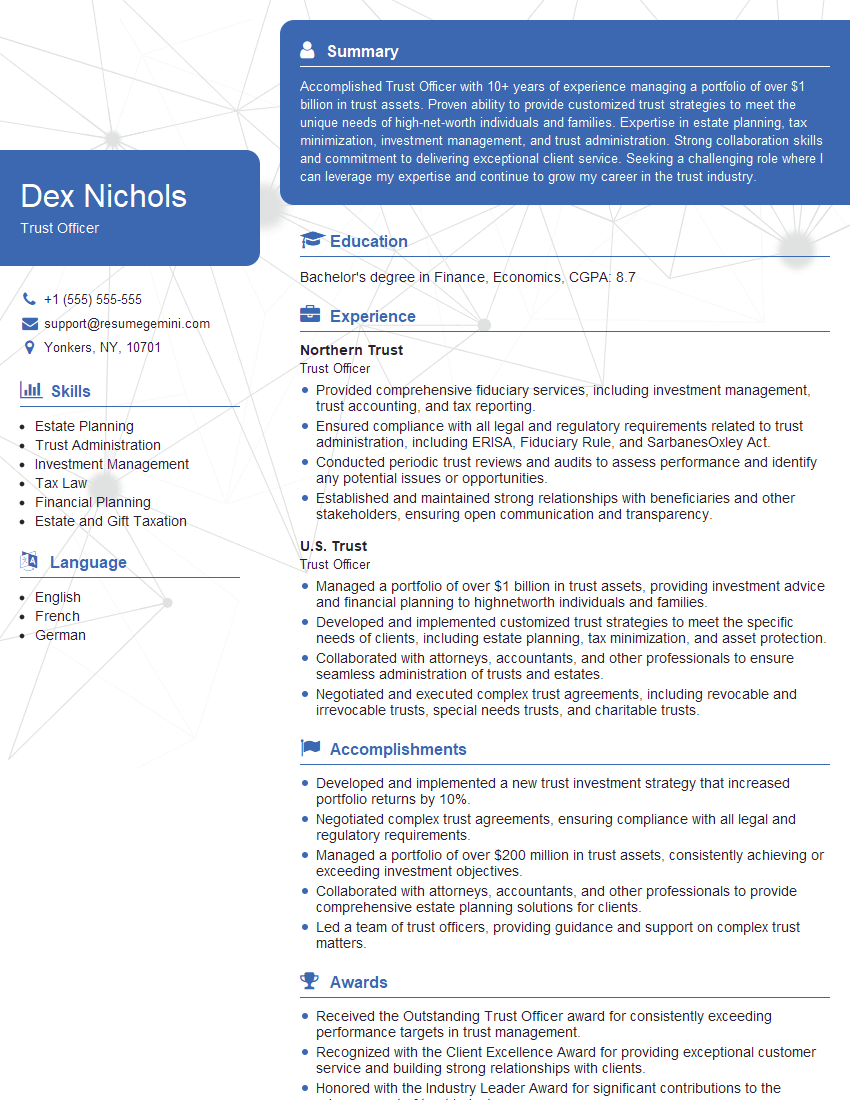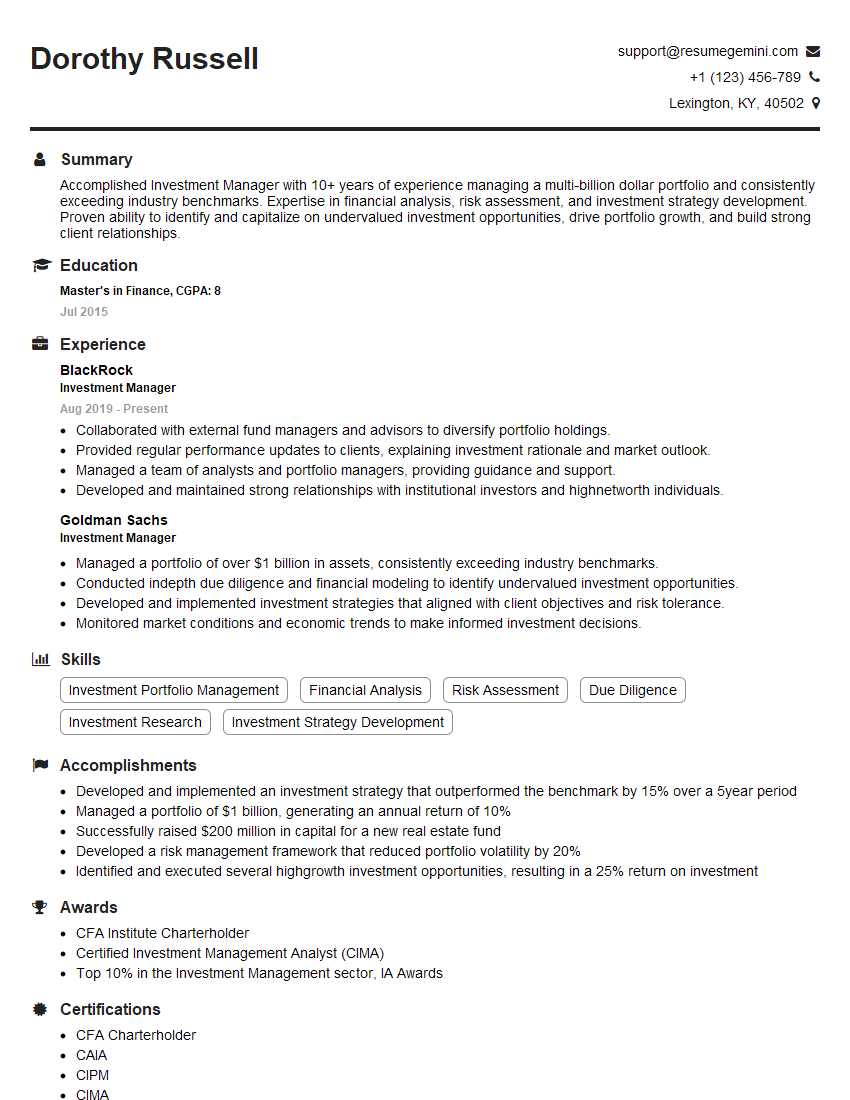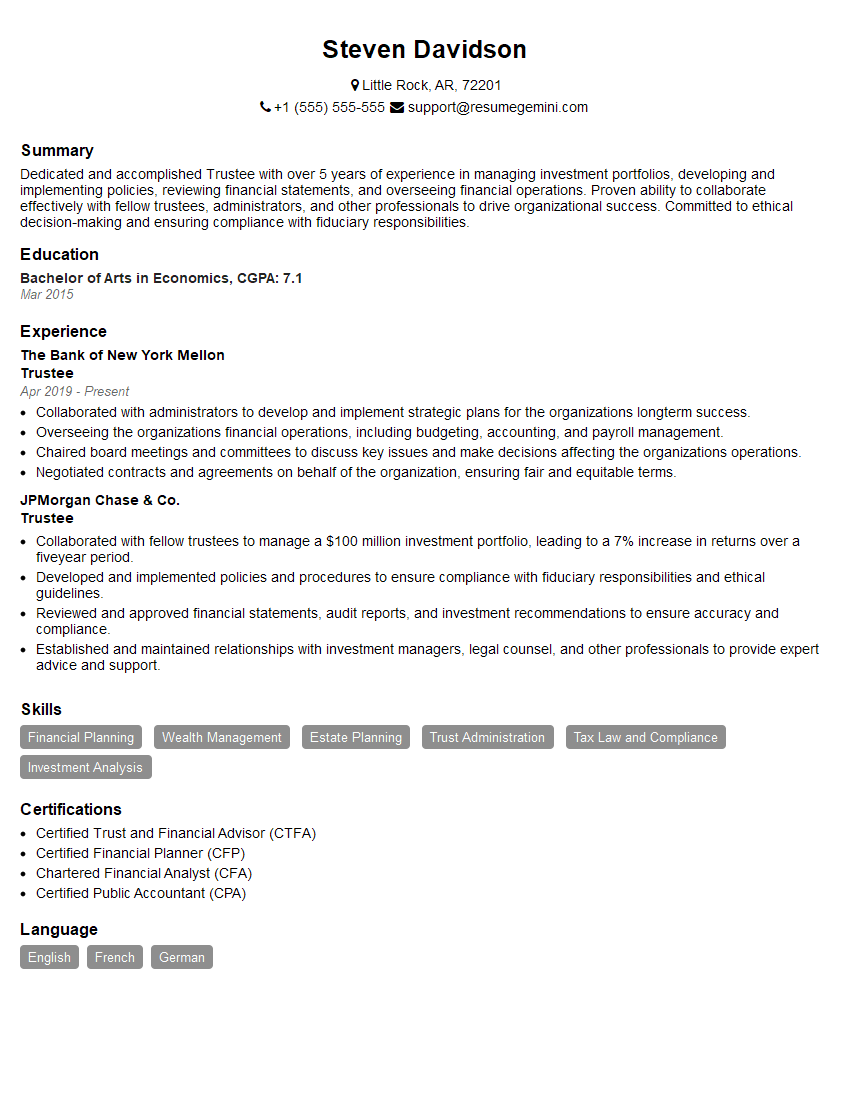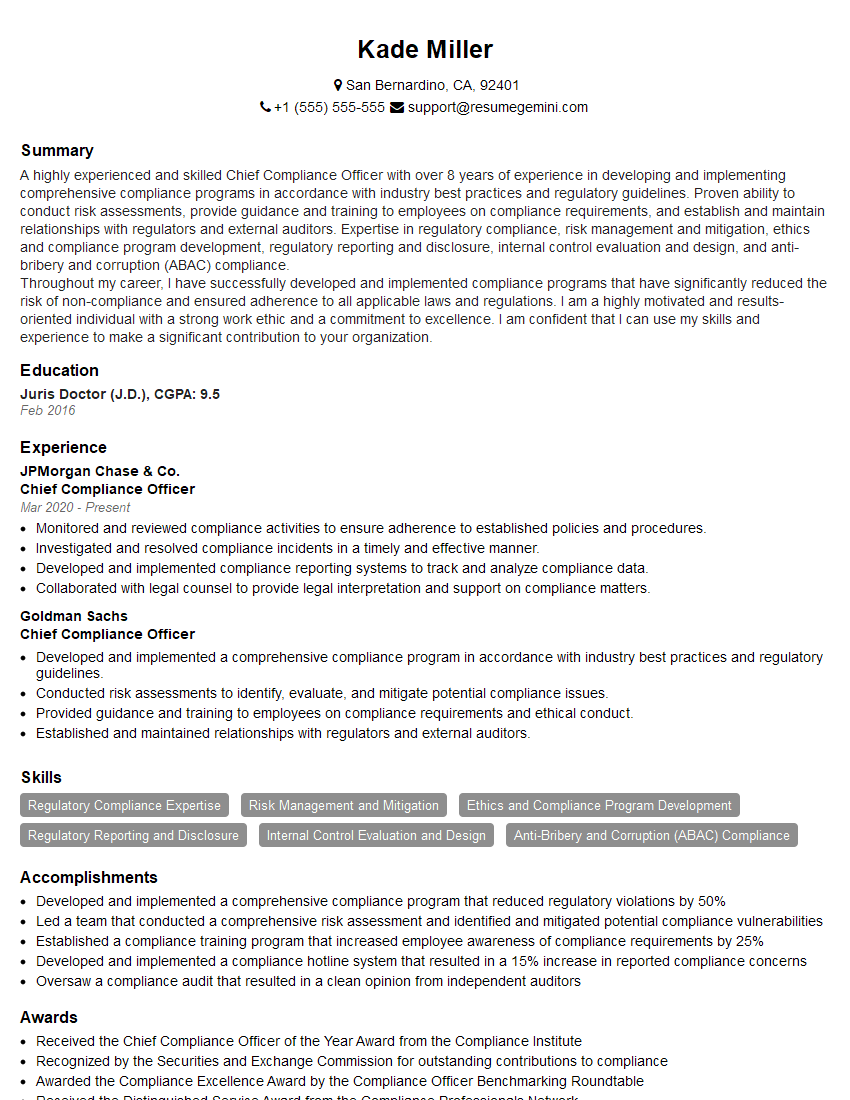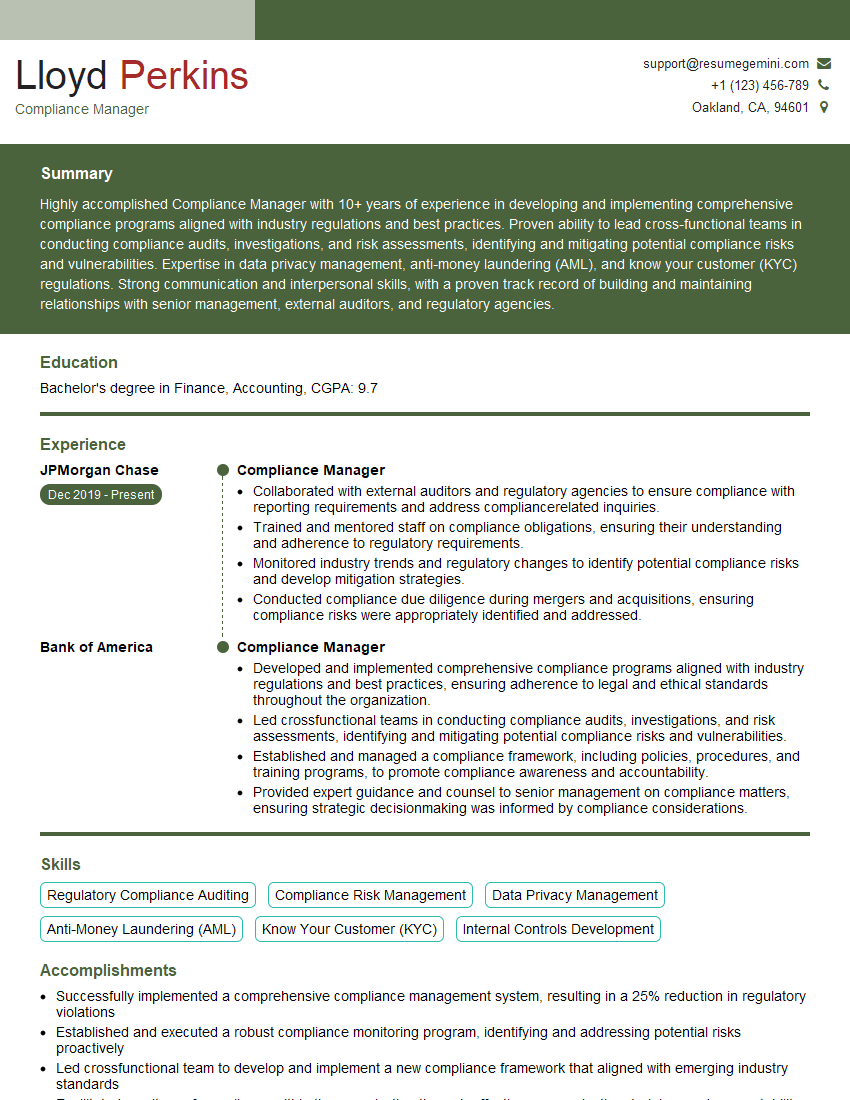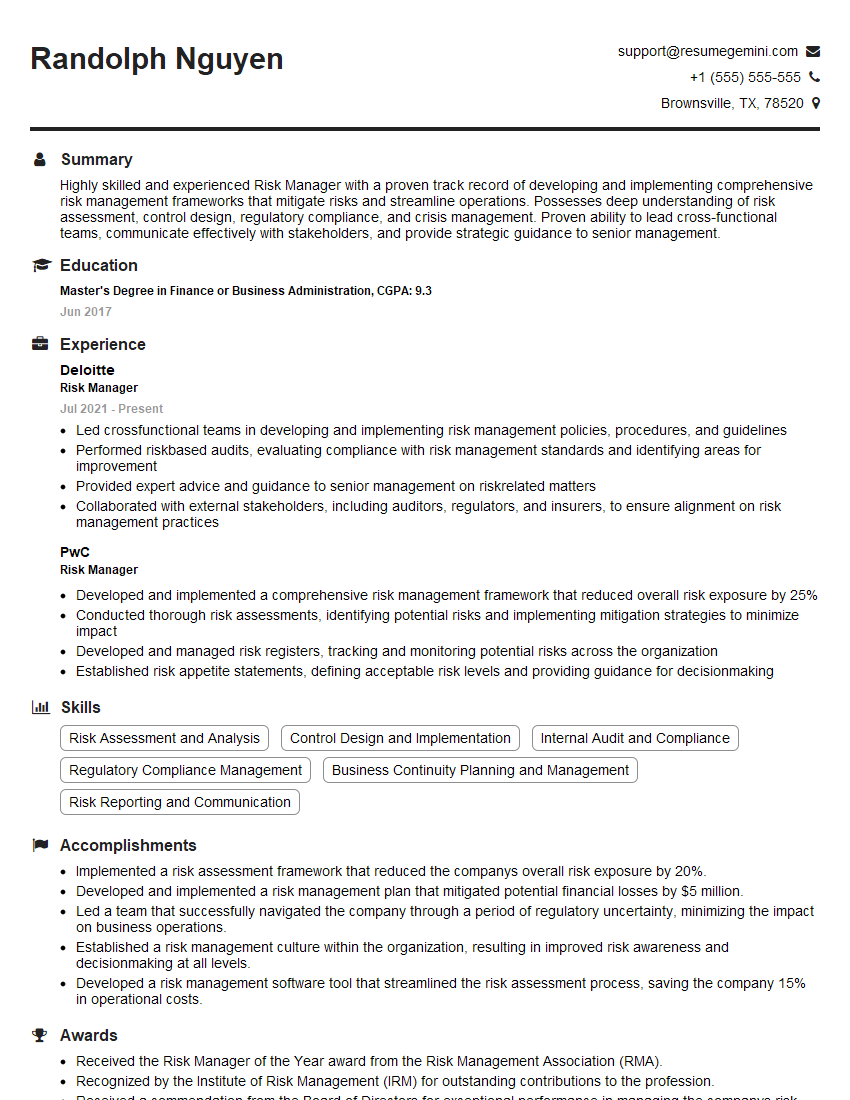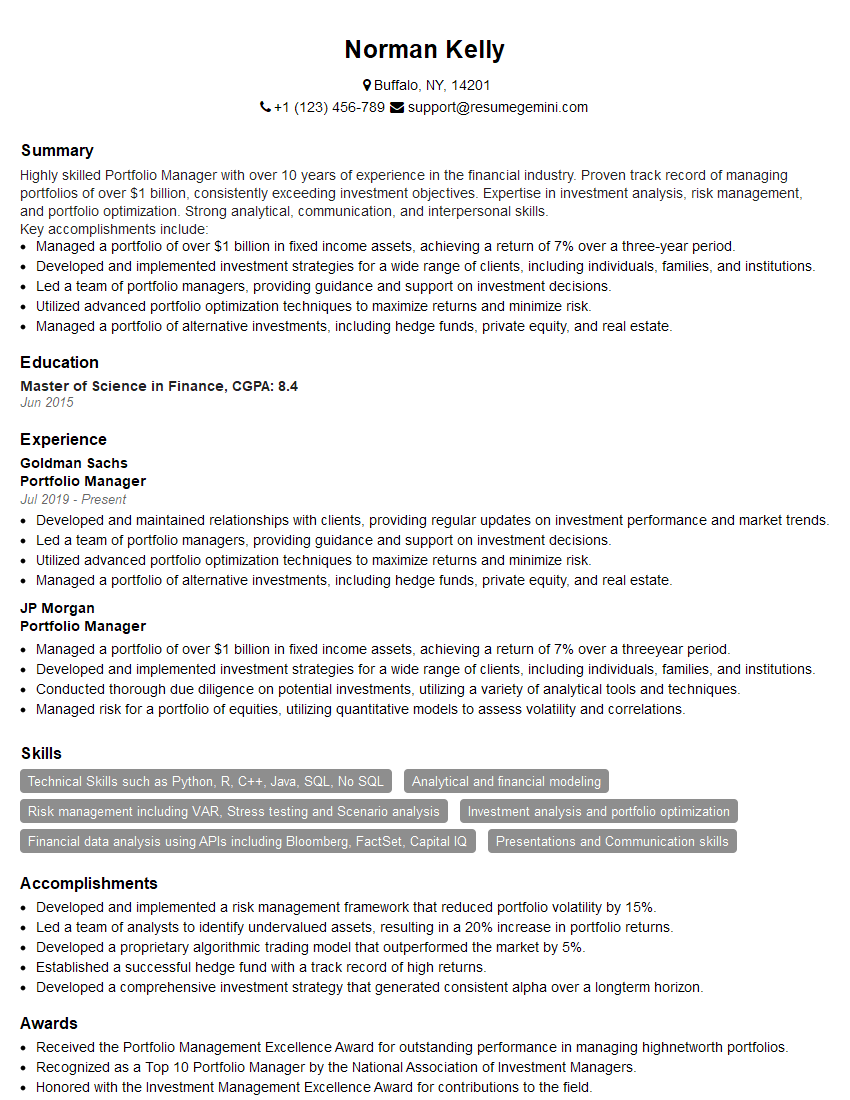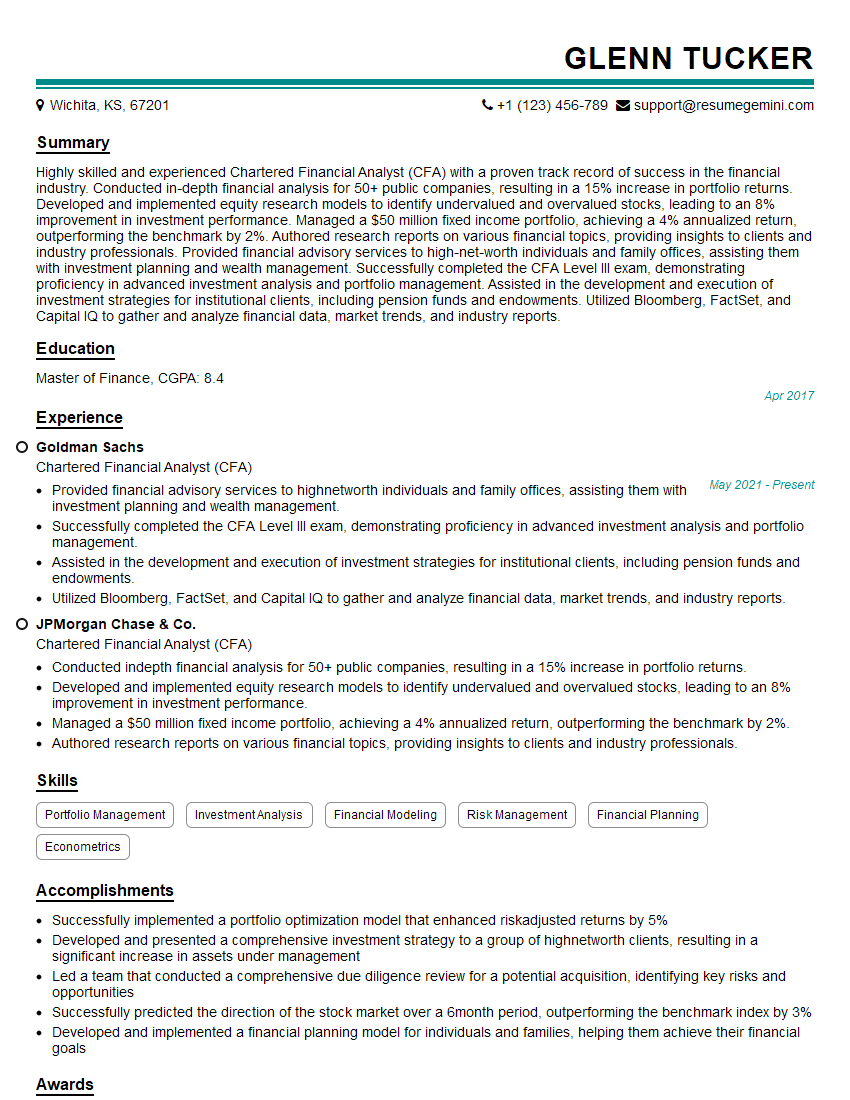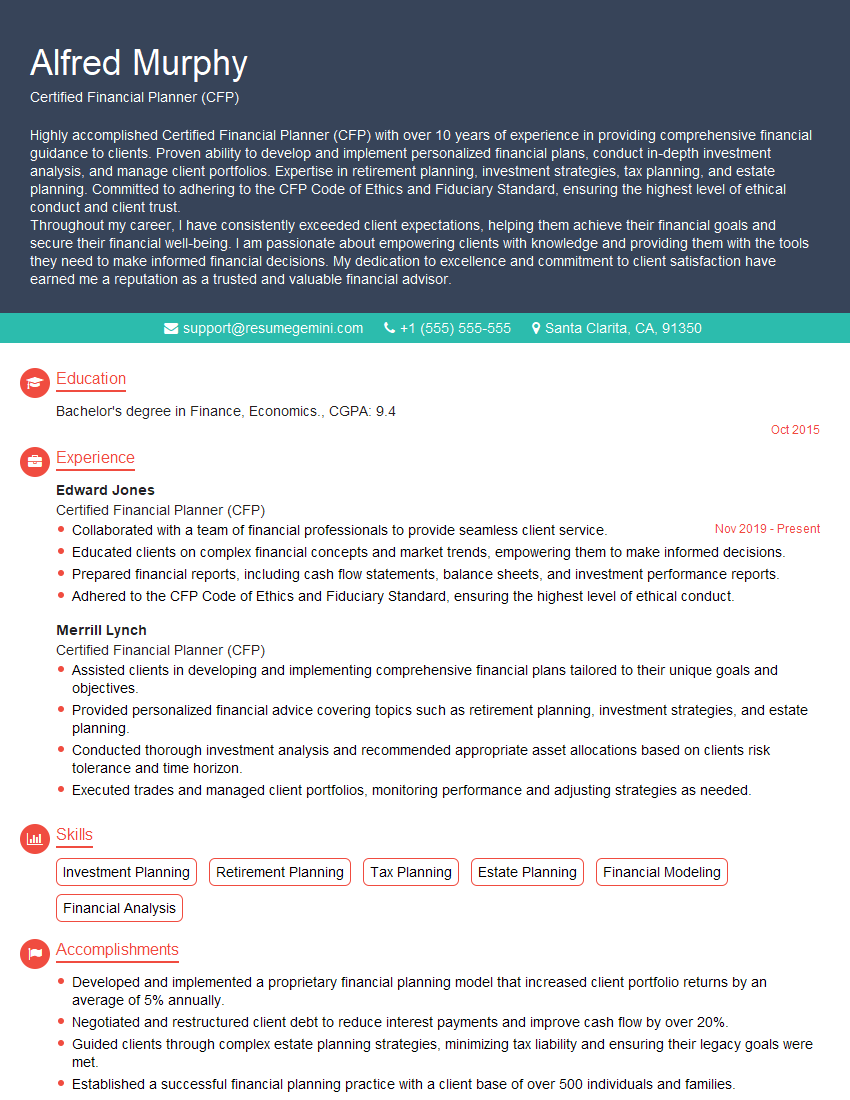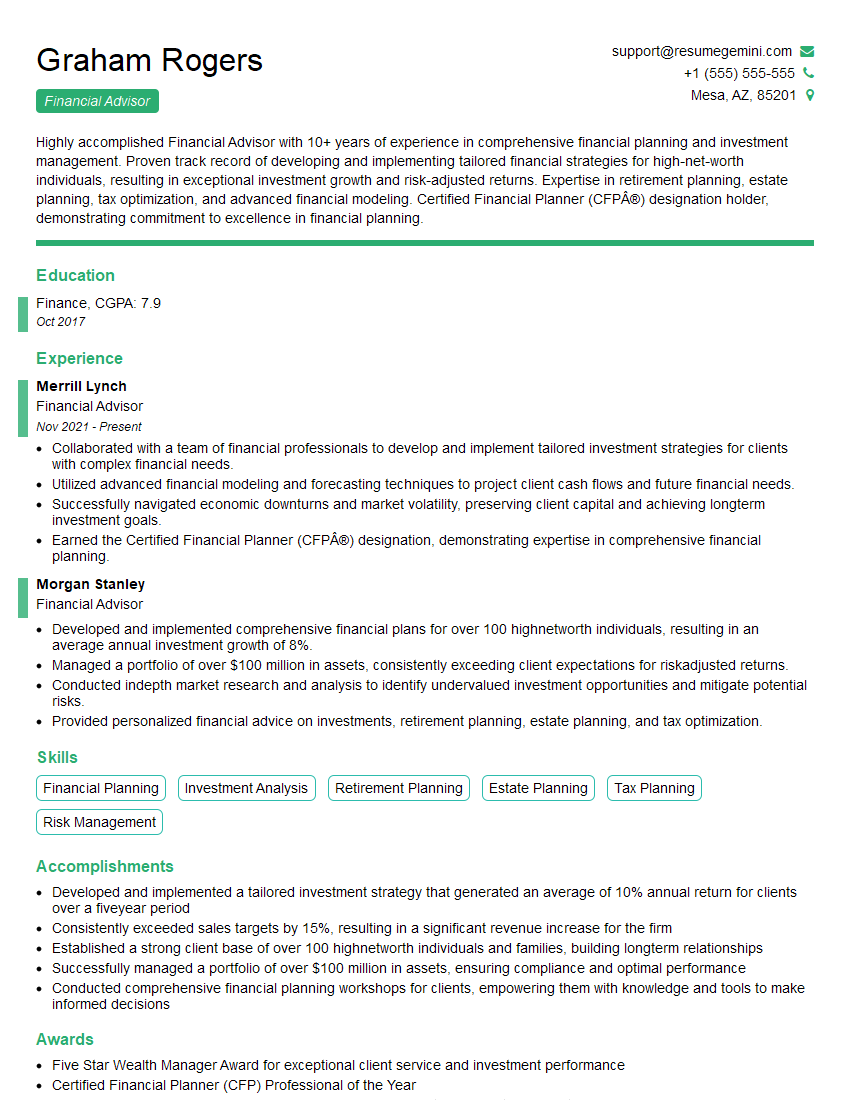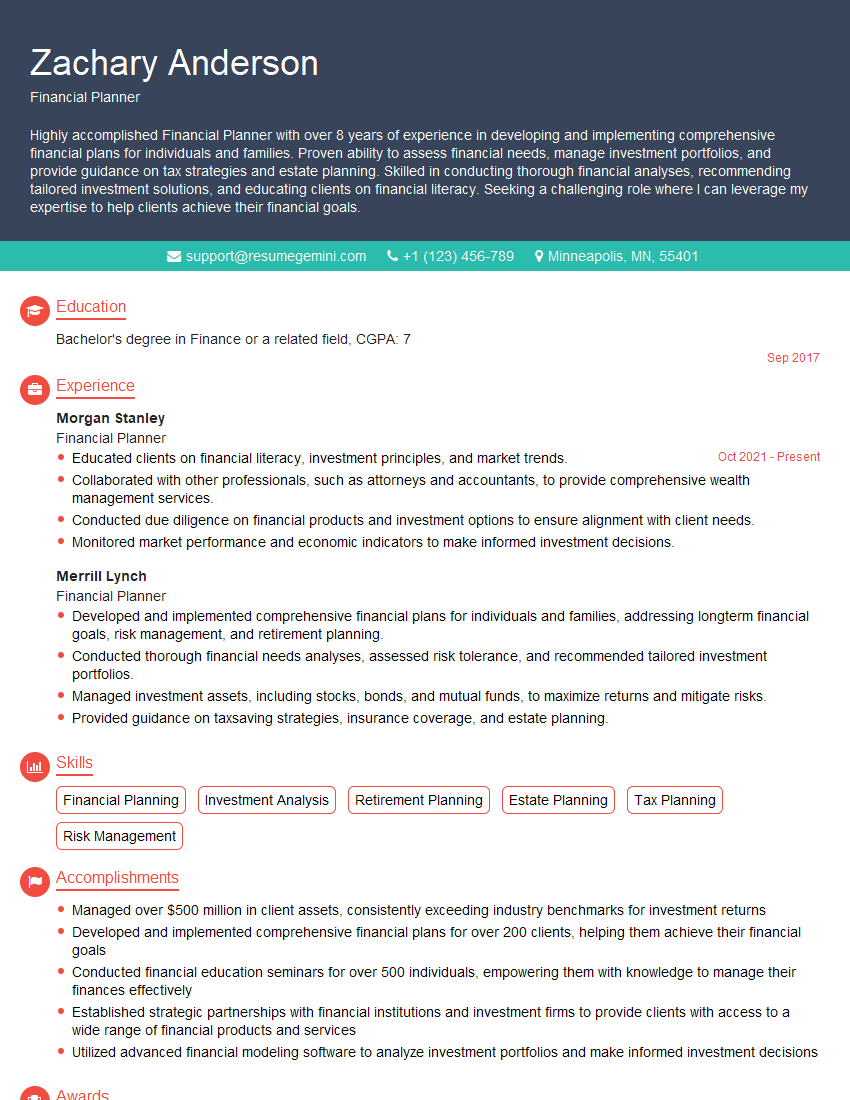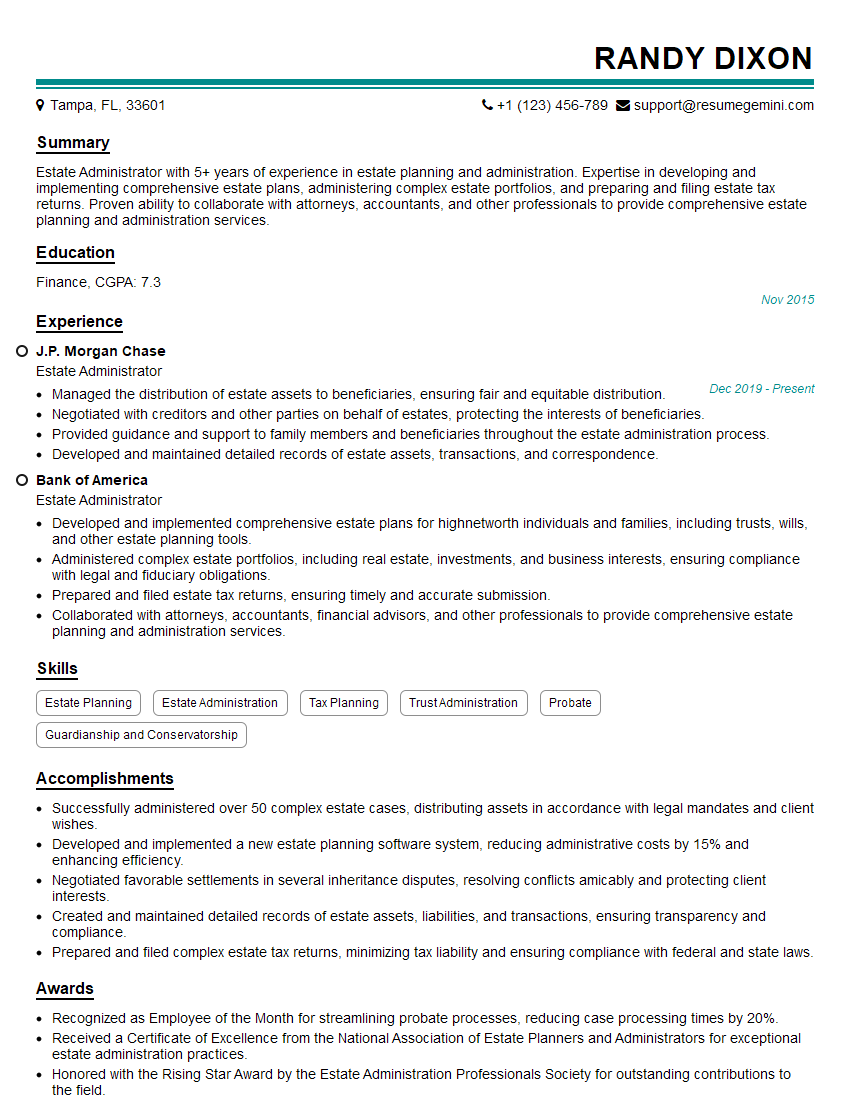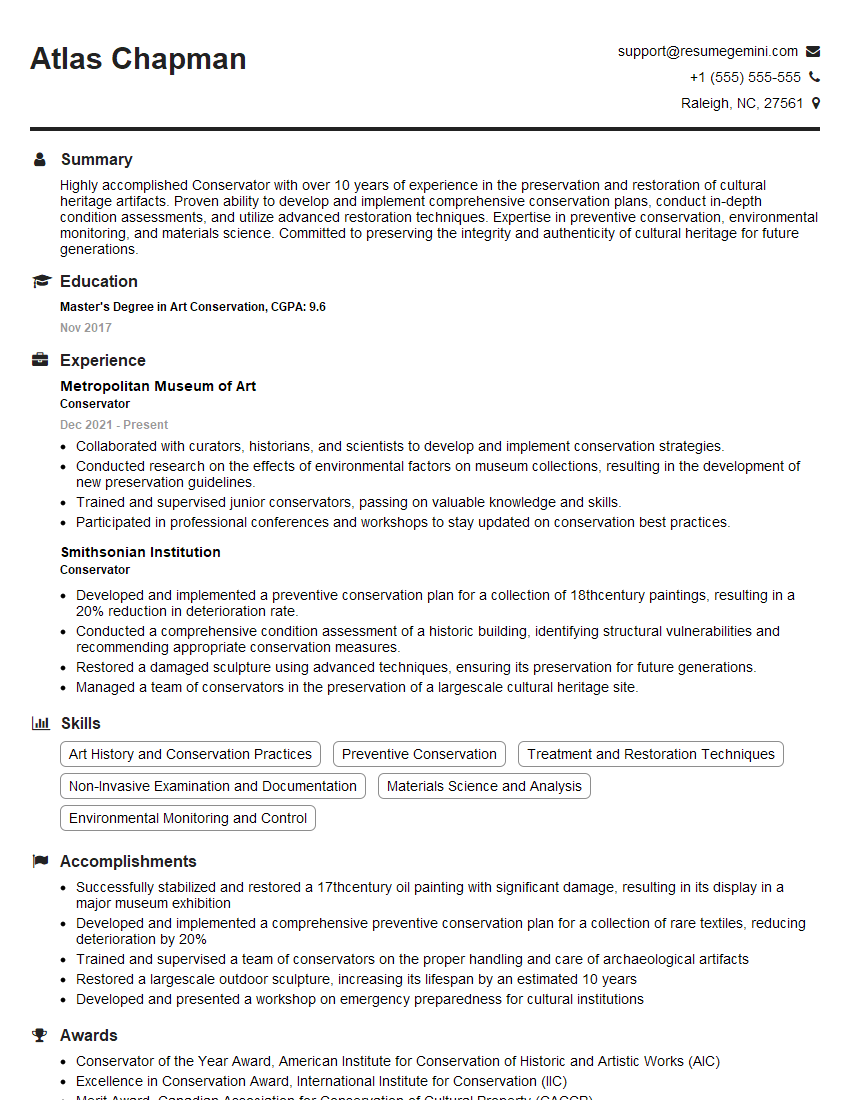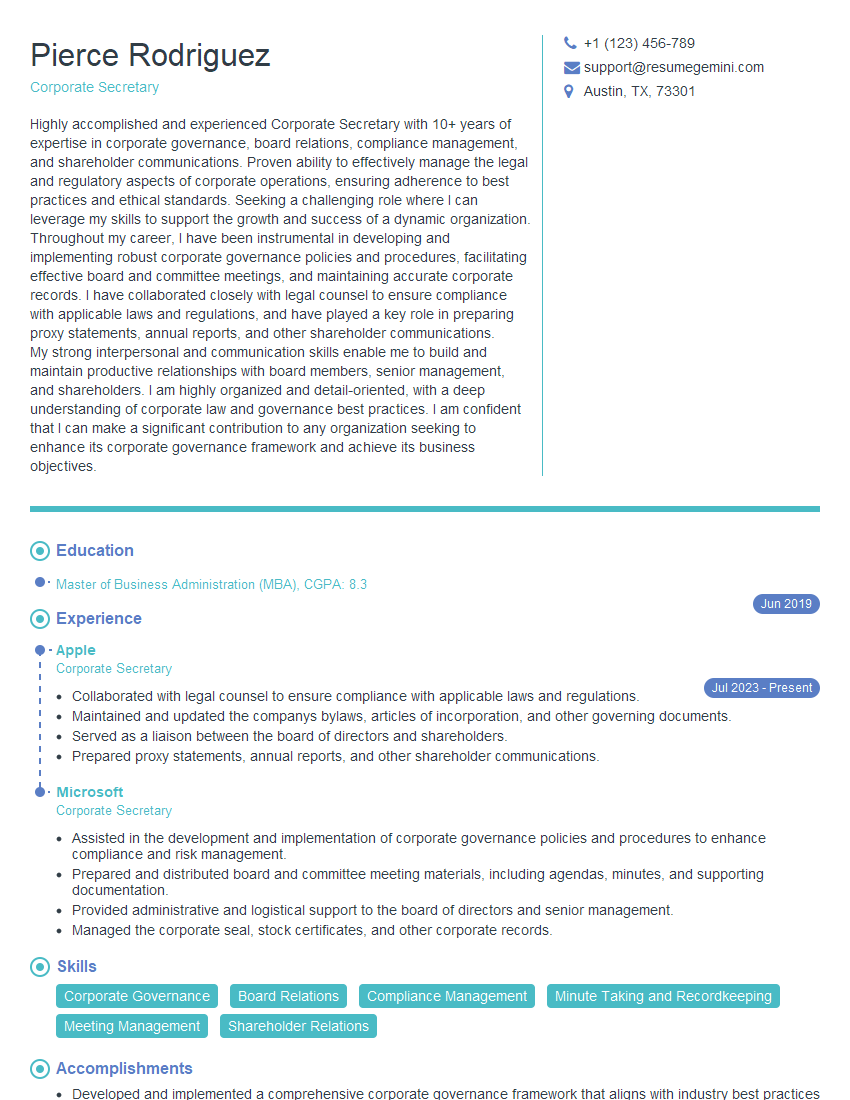Feeling uncertain about what to expect in your upcoming interview? We’ve got you covered! This blog highlights the most important Understanding of Fiduciary Responsibilities interview questions and provides actionable advice to help you stand out as the ideal candidate. Let’s pave the way for your success.
Questions Asked in Understanding of Fiduciary Responsibilities Interview
Q 1. Define ‘fiduciary duty’ and its core principles.
A fiduciary duty is a legal obligation to act in the best interests of another person or entity. It’s a relationship of trust and confidence where one party (the fiduciary) has a legal and ethical responsibility to prioritize the needs of another party (the beneficiary). The core principles revolve around loyalty, good faith, and the avoidance of conflicts of interest. Think of it like this: a fiduciary is a guardian of someone else’s assets or interests.
- Loyalty: The fiduciary must always act in the beneficiary’s best interests, placing the beneficiary’s needs above their own.
- Good Faith: The fiduciary must act honestly and with transparency, disclosing all relevant information to the beneficiary.
- Prudence: The fiduciary must exercise reasonable care, skill, and diligence in managing the beneficiary’s affairs.
- No Self-Dealing: The fiduciary cannot profit from the relationship at the expense of the beneficiary.
Q 2. Explain the difference between a trustee and an executor.
While both trustees and executors manage assets for the benefit of others, their roles and the contexts in which they operate differ significantly.
- Executor: An executor is appointed in a will to manage the deceased person’s estate. Their primary responsibility is to settle the estate according to the will’s instructions, which might include paying debts, distributing assets to heirs, and filing necessary tax returns. Their duties are time-limited – ending once the estate is settled.
- Trustee: A trustee manages assets held in a trust for the benefit of beneficiaries. Trusts can be established for various reasons, such as managing assets for minors, protecting assets from creditors, or providing ongoing income to beneficiaries. A trustee’s duties can last for many years or even generations, depending on the terms of the trust.
In essence, an executor deals with a deceased person’s assets for a finite period, while a trustee manages assets for beneficiaries over a potentially much longer timeframe according to the trust’s specifications.
Q 3. Describe the duty of loyalty in a fiduciary relationship.
The duty of loyalty is paramount in any fiduciary relationship. It demands that the fiduciary act solely in the best interests of the beneficiary, subordinating their own interests completely. This means avoiding any actions that could benefit the fiduciary at the expense of the beneficiary, even if those actions appear to be minor or inconsequential.
For example, a trustee cannot invest trust funds in a company they own, even if they believe it’s a sound investment, as it creates a conflict of interest. The trustee must prioritize the beneficiary’s potential returns over their own personal gain. Any deviation from this principle can lead to significant legal ramifications.
Q 4. What is the duty of care in a fiduciary context?
The duty of care requires a fiduciary to act with the skill, diligence, and prudence that a reasonably prudent person would exercise in similar circumstances. This is not just about avoiding negligence; it involves proactively managing the assets or responsibilities entrusted to them.
For instance, a financial advisor acting as a fiduciary must conduct thorough due diligence before recommending investments, keeping abreast of market trends, and regularly reviewing the beneficiary’s portfolio. Failing to do so could be a breach of the duty of care, even if no malicious intent was involved. The standard is essentially that of a reasonable professional in that field.
Q 5. Explain the duty of prudence in investment decision-making.
The duty of prudence dictates that investment decisions made on behalf of a beneficiary must be reasonable and calculated to preserve and enhance the value of their assets. It involves careful consideration of the beneficiary’s risk tolerance, investment goals, and the overall economic climate.
Prudent investment practices often involve diversification (spreading investments across various asset classes), regular monitoring of portfolio performance, and appropriate risk management strategies. A fiduciary must justify their investment choices and demonstrate they acted in a way a reasonable investor would under similar circumstances. Simply chasing high returns without considering risk is a breach of this duty.
Q 6. How does a conflict of interest arise in a fiduciary context?
A conflict of interest arises when a fiduciary has a personal interest that could potentially conflict with their duty to act solely in the best interests of the beneficiary. This can manifest in many ways.
- Self-Dealing: The fiduciary benefits directly from a transaction involving the beneficiary’s assets.
- Competing Interests: The fiduciary has interests in another business or venture that could potentially compete with the beneficiary’s interests.
- Personal Gain: The fiduciary receives a personal benefit (financial or otherwise) from a decision made on behalf of the beneficiary.
- Undisclosed Relationships: The fiduciary has a personal relationship with a party involved in a transaction that could influence their decision-making.
For example, a lawyer acting as trustee for a client’s estate might have a conflict of interest if they also represent a company bidding to purchase a valuable asset within that estate.
Q 7. What steps should be taken to manage or avoid conflicts of interest?
Managing or avoiding conflicts of interest is crucial for maintaining the integrity of a fiduciary relationship. Several steps should be taken:
- Full Disclosure: The fiduciary must disclose any potential conflicts of interest to the beneficiary, providing sufficient information for the beneficiary to make an informed decision.
- Recusal: If a conflict of interest cannot be avoided or resolved, the fiduciary should recuse themselves from the relevant decision-making process. This involves stepping aside and allowing an independent party to handle the matter.
- Independent Advice: The beneficiary should seek independent legal or financial advice to ensure they are making informed decisions regarding the matter in question.
- Establishment of Firewalls: In larger organizations, establishing clear internal policies and procedures (firewalls) to separate potentially conflicting responsibilities can be beneficial.
- Transparency and Documentation: Maintaining meticulous records of all transactions and decision-making processes is essential to demonstrate compliance with fiduciary duties.
Proactive identification and management of potential conflicts of interest are key to upholding the fiduciary’s duty of loyalty and maintaining the trust and confidence of the beneficiary.
Q 8. Describe a scenario where a breach of fiduciary duty occurred.
A breach of fiduciary duty occurs when a fiduciary—someone entrusted with the care of another’s assets or interests—acts in a way that prioritizes their own interests over those of the beneficiary. This violates the core principle of loyalty and good faith inherent in the fiduciary relationship.
Scenario: Imagine a financial advisor managing a client’s retirement portfolio. The advisor secretly invests a significant portion of the client’s funds into a high-risk, high-commission investment product that benefits the advisor personally, despite knowing it’s unsuitable for the client’s risk tolerance and retirement goals. This is a clear breach of fiduciary duty because the advisor prioritized personal gain over the client’s best interests.
Another example would be a trustee of a trust who uses trust funds for personal expenses. This is a clear violation of the fiduciary duty of loyalty and is a criminal offense in most jurisdictions.
Q 9. What are the potential consequences of a breach of fiduciary duty?
The consequences of a breach of fiduciary duty can be severe and far-reaching. They can include:
- Civil Liability: The fiduciary can be sued by the beneficiary for damages resulting from the breach. This might involve recovering lost funds, profits made by the fiduciary through the breach, or compensation for emotional distress.
- Criminal Prosecution: In cases of egregious breaches involving fraud, theft, or embezzlement, criminal charges can be filed, leading to fines, imprisonment, and a criminal record.
- Loss of License or Certification: Professionals such as financial advisors, lawyers, or accountants can lose their licenses or certifications, effectively ending their careers.
- Reputational Damage: A breach of fiduciary duty can severely damage the fiduciary’s reputation, making it difficult to find future clients or employment.
- Injunctions: A court may issue an injunction to prevent the fiduciary from further actions harming the beneficiary.
The severity of the consequences depends on the nature and extent of the breach, as well as the jurisdiction.
Q 10. How do you determine the appropriate level of risk in managing fiduciary assets?
Determining the appropriate level of risk for fiduciary assets requires a careful and individualized approach. It’s not a one-size-fits-all solution.
The process typically involves:
- Understanding the Beneficiary’s Circumstances: This includes their age, risk tolerance, investment goals (e.g., retirement, education), time horizon, and financial situation. A young beneficiary with a long time horizon might tolerate higher risk than an elderly beneficiary nearing retirement.
- Defining Investment Objectives: Clearly establishing the goals for the assets is crucial. Are we aiming for capital preservation, income generation, or capital appreciation?
- Developing an Investment Policy Statement (IPS): This formal document outlines the investment strategy, acceptable risk levels, and permissible asset classes. The IPS serves as a roadmap and helps to avoid impulsive decisions.
- Diversification: Spreading investments across various asset classes (stocks, bonds, real estate, etc.) to reduce overall portfolio risk is a cornerstone of prudent investment management.
- Regular Monitoring and Review: The investment strategy should be regularly reviewed and adjusted as circumstances change or market conditions evolve. This ensures the portfolio remains aligned with the beneficiary’s needs and objectives.
Ultimately, the appropriate level of risk is a balance between achieving the beneficiary’s goals and protecting their assets from undue losses. It’s a judgment call informed by professional expertise, careful analysis, and a deep understanding of the beneficiary’s needs.
Q 11. Explain the importance of record-keeping in fiduciary responsibilities.
Meticulous record-keeping is paramount in fiduciary responsibilities. It’s essential for demonstrating compliance, protecting against legal challenges, and ensuring transparency and accountability.
The importance lies in:
- Demonstrating Prudence: Detailed records prove that investment decisions were made in accordance with the beneficiary’s best interests and the applicable laws and regulations.
- Auditing and Accountability: Thorough records allow for independent audits and assessments of the fiduciary’s performance. This ensures transparency and prevents any potential conflicts of interest or mismanagement.
- Legal Protection: In case of a dispute or legal action, comprehensive records serve as irrefutable evidence of the fiduciary’s actions and the decisions made. This significantly strengthens the fiduciary’s defense.
- Tax Compliance: Accurate records are vital for preparing tax returns and ensuring compliance with tax laws.
- Beneficiary Communication: Records provide a clear and consistent basis for communicating with beneficiaries about the performance and management of their assets.
The specific records needed will vary depending on the nature of the fiduciary relationship and the assets managed. However, they generally include transaction records, investment reports, communication logs, and meeting minutes.
Q 12. How do you ensure compliance with relevant laws and regulations?
Ensuring compliance with relevant laws and regulations requires a multi-faceted approach involving:
- Staying Updated: Fiduciaries must remain current on all applicable laws, regulations, and industry best practices. This involves continuous professional development and regular review of legal and regulatory updates.
- Seeking Legal Counsel: Consulting with legal professionals to understand the specific requirements and potential implications of relevant laws is crucial, especially in complex situations.
- Internal Controls: Implementing robust internal controls and procedures to manage risk and prevent violations is essential. This includes clear delegation of authority, segregation of duties, and regular internal audits.
- External Audits: Undergoing periodic independent audits by qualified professionals ensures that the fiduciary’s activities comply with the relevant standards and regulations.
- Documentation: Maintaining meticulous records of all activities and decisions is critical for demonstrating compliance during any investigation or audit.
- Compliance Programs: Implementing a comprehensive compliance program which includes training for all personnel and regular updates is crucial.
Non-compliance can lead to significant penalties and legal repercussions, highlighting the paramount importance of proactive compliance efforts.
Q 13. What is your understanding of the Uniform Prudent Investor Act (UPIA)?
The Uniform Prudent Investor Act (UPIA) is a significant piece of legislation that modernized the legal standard for investment management by fiduciaries. It replaced the older “prudent man rule” with a more flexible and contemporary approach.
Key aspects of the UPIA include:
- Portfolio Approach: The act emphasizes a portfolio-based approach, meaning that the prudence of an investment should be evaluated in the context of the entire investment portfolio, rather than evaluating each investment in isolation.
- Diversification: UPIA encourages diversification of investments across different asset classes to reduce risk. However, it doesn’t mandate a specific diversification strategy.
- Modern Investment Strategies: The act allows fiduciaries to employ a wider range of investment strategies, including more sophisticated ones, as long as they are consistent with the beneficiary’s objectives and risk tolerance.
- Duty of Loyalty and Prudence: The core tenets of the UPIA revolve around the fiduciary’s duty of loyalty and prudence, always acting in the best interests of the beneficiary.
- Consideration of Factors: The act mandates that fiduciaries consider a wide range of factors when making investment decisions, such as inflation, taxes, and the beneficiary’s circumstances.
The UPIA has been adopted by most US states, providing a consistent legal framework for fiduciary investment management.
Q 14. How would you handle a situation where a beneficiary disagrees with your investment decisions?
Handling a situation where a beneficiary disagrees with investment decisions requires diplomacy, transparency, and a commitment to clear communication.
My approach would involve:
- Open and Honest Dialogue: I would schedule a meeting with the beneficiary to calmly and thoroughly explain the rationale behind the investment decisions. This includes presenting data, market analysis, and the overall investment strategy.
- Reviewing the Investment Policy Statement (IPS): I would reaffirm that the investment decisions are aligned with the IPS, which should have been agreed upon beforehand and reflects the beneficiary’s risk tolerance and investment goals. If the IPS needs updating, I will guide the beneficiary through the process of amending it.
- Seeking External Expertise (If Necessary): If the disagreement persists, I might suggest involving an independent financial advisor or other qualified professional to offer a neutral perspective.
- Documentation: All communications and decisions related to the dispute should be meticulously documented.
- Mediation (If Necessary): If other methods fail to resolve the disagreement, I would explore the possibility of mediation to facilitate a mutually acceptable solution.
The goal is to reach a resolution that is both legally sound and respects the beneficiary’s concerns while adhering to my fiduciary responsibilities.
Q 15. What is your experience with fiduciary litigation?
My experience with fiduciary litigation spans over 15 years, encompassing both defense and plaintiff representation. I’ve handled cases involving breach of fiduciary duty, improper investment strategies, self-dealing, and conflicts of interest. A particularly memorable case involved a trustee accused of mismanaging a family trust, leading to significant financial losses for the beneficiaries. Through meticulous document review, witness interviews, and expert testimony, we successfully defended the trustee against the allegations, highlighting the complexities of managing investments within the constraints of a trust agreement and demonstrating their adherence to established fiduciary standards. This experience has sharpened my understanding of the legal ramifications of fiduciary actions and reinforced the importance of meticulous record-keeping and transparent decision-making.
Furthermore, I’ve been involved in several cases concerning the interpretation of trust documents and the application of relevant laws, which highlighted the crucial role of clear communication and well-defined trust terms to avoid future disputes. My work has involved collaborating closely with forensic accountants, financial advisors, and legal experts to build strong cases, ensuring a comprehensive understanding of the financial aspects of these complex cases.
Career Expert Tips:
- Ace those interviews! Prepare effectively by reviewing the Top 50 Most Common Interview Questions on ResumeGemini.
- Navigate your job search with confidence! Explore a wide range of Career Tips on ResumeGemini. Learn about common challenges and recommendations to overcome them.
- Craft the perfect resume! Master the Art of Resume Writing with ResumeGemini’s guide. Showcase your unique qualifications and achievements effectively.
- Don’t miss out on holiday savings! Build your dream resume with ResumeGemini’s ATS optimized templates.
Q 16. Explain your understanding of different types of trusts.
Trusts are legal entities that hold assets for the benefit of others. Several types exist, each with unique characteristics:
- Revocable Trusts: The grantor retains control and can modify or terminate the trust at any time.
- Irrevocable Trusts: The grantor relinquishes control once established, providing asset protection and tax benefits. Examples include:
- Charitable Trusts: Assets are managed for charitable purposes.
- Spendthrift Trusts: Protect assets from creditors for the beneficiary’s benefit.
- Special Needs Trusts: Manage assets for individuals with disabilities without jeopardizing government benefits.
- Testamentary Trusts: Take effect upon the grantor’s death, as outlined in their will.
- Living Trusts (Inter Vivos Trusts): Established during the grantor’s lifetime, offering flexibility in asset management and avoiding probate.
Understanding these distinctions is critical for proper fiduciary management because each type dictates the scope of responsibilities and permissible actions. For instance, a revocable trust allows for more flexibility, while an irrevocable trust imposes stricter guidelines on how the assets should be managed. Choosing the appropriate type of trust is a critical decision requiring careful consideration of legal and tax implications.
Q 17. How do you communicate effectively with beneficiaries and stakeholders?
Effective communication with beneficiaries and stakeholders is paramount. My approach is multifaceted:
- Regular Reporting: I provide clear, concise, and timely reports detailing investment performance, transactions, and any significant events affecting the trust.
- Open Communication Channels: I encourage open dialogue, responding promptly to inquiries and proactively addressing concerns. This might involve regular meetings, phone calls, or emails depending on the beneficiaries’ preferences and the complexity of the situation.
- Plain Language: I avoid jargon and technical language, ensuring all communications are readily understandable. Complex financial information is explained in simple terms with analogies and examples, ensuring everyone understands the implications of decisions.
- Transparency and Accountability: I maintain detailed records of all decisions and actions, which are available for review upon request. I believe in open communication to build trust and confidence with my clients.
- Tailored Communication: I adapt my communication style to suit the individual needs and understanding of each beneficiary or stakeholder. I recognize that not everyone has the same level of financial literacy, and I always aim to provide information in a way that is accessible and relevant.
For instance, with elderly beneficiaries, I might prefer more frequent, shorter phone calls and simplified reports, while younger, more financially savvy beneficiaries might prefer detailed email reports and less frequent meetings.
Q 18. Describe your process for asset allocation in a fiduciary capacity.
My asset allocation process is a rigorous, multi-step approach centered around the beneficiaries’ needs and the trust’s objectives. It begins with a thorough understanding of:
- Beneficiary Needs: This includes their risk tolerance, time horizon, and financial goals (e.g., education funding, retirement income).
- Trust Documents: The trust agreement explicitly outlines investment restrictions and objectives.
- Market Conditions: I consider prevailing economic conditions, interest rates, and market volatility.
Then, I develop a diversified portfolio using a combination of asset classes (stocks, bonds, real estate, etc.) to achieve the desired risk-adjusted return. This is regularly reviewed and rebalanced to maintain the desired allocation and adapt to changing circumstances. I utilize modern portfolio theory and consider factors like correlation and diversification to optimize the risk and return profile of the portfolio. Regular monitoring and performance analysis are essential parts of this ongoing process.
For example, if a beneficiary has a short time horizon and low risk tolerance, the portfolio might be heavily weighted towards fixed-income securities. Conversely, a beneficiary with a long time horizon and high risk tolerance could support a portfolio with a significant allocation to equities. Documentation of each step in the process ensures transparency and accountability, which are paramount in fiduciary management.
Q 19. How do you measure the success of your fiduciary management?
Measuring the success of fiduciary management goes beyond simply tracking financial returns. It’s a holistic assessment considering:
- Investment Performance: Benchmarking returns against relevant market indices and comparable portfolios. This involves analyzing alpha and beta, Sharpe ratios, and other key performance indicators to assess efficiency.
- Compliance and Risk Management: Maintaining adherence to the trust document’s guidelines, legal regulations, and ethical standards, minimizing risk exposures.
- Beneficiary Satisfaction: Regularly assessing beneficiary satisfaction through feedback and communication. Are their needs being met? Are they comfortable with the investment strategy and communication received?
- Cost-Effectiveness: Maintaining a reasonable balance between fees and investment performance. Are the administrative and management expenses justified by the results?
A combination of quantitative and qualitative measures helps paint a complete picture of management effectiveness. For instance, strong investment returns alone aren’t sufficient if the strategy involves excessive risk or violates the trust’s objectives. A happy beneficiary is a testament to success, but it should be complemented by strong performance metrics and impeccable compliance records. Regular reporting on all these facets ensures transparency and accountability.
Q 20. What are some common ethical dilemmas faced in fiduciary roles?
Fiduciary roles present several ethical dilemmas. Some common ones include:
- Conflicts of Interest: A fiduciary might have personal interests that conflict with the beneficiaries’ best interests. For example, recommending an investment in a company where the fiduciary has a stake.
- Self-Dealing: Using trust assets for personal gain. This is a serious breach of fiduciary duty.
- Duty of Loyalty vs. Duty of Prudence: Balancing the need to preserve assets with the responsibility to generate reasonable returns. A conservative investment strategy might not maximize returns, but it protects against losses.
- Beneficiary Disputes: Managing disagreements among beneficiaries with differing needs or preferences.
- Confidentiality vs. Legal Obligation: Balancing confidentiality obligations with the need to disclose information to relevant authorities when required by law.
Navigating these dilemmas requires strong ethical judgment, adherence to professional standards, and, when necessary, seeking independent legal advice to ensure compliance and protect the interests of the beneficiaries.
Q 21. How do you handle confidential information in a fiduciary relationship?
Confidentiality is a cornerstone of fiduciary relationships. I handle confidential information using several strategies:
- Strict Confidentiality Policies: Implementing strict policies that limit access to sensitive information only to authorized individuals.
- Secure Data Storage: Using secure electronic and physical storage methods to protect against unauthorized access.
- Data Encryption: Employing encryption techniques to protect data during transmission and storage.
- Confidentiality Agreements: Requiring confidentiality agreements from all involved parties to enforce the need for discretion.
- Limited Information Sharing: Sharing information only on a need-to-know basis and only with authorized parties.
For example, all client data is stored in encrypted format, and access is controlled using strong passwords and multi-factor authentication. Furthermore, all staff members undergo mandatory training on data security and confidentiality. This comprehensive approach ensures the protection of sensitive information and maintains the trust and confidence of beneficiaries.
Q 22. How would you respond to accusations of misconduct or mismanagement?
Accusations of misconduct or mismanagement are taken extremely seriously. My first response would be to thoroughly investigate the claims, gathering all relevant documentation and evidence. Transparency is key; I would cooperate fully with any internal or external review.
My approach emphasizes proactive risk management. For example, maintaining meticulous records of all transactions, decisions, and communications, along with documented rationale for each investment strategy, creates a strong defense against unfounded accusations. If the accusations have merit, I would acknowledge any shortcomings, take responsibility for my actions, and work to rectify the situation, potentially including restitution where appropriate.
Imagine a scenario where an investor alleges a conflict of interest in an investment choice. My response would involve providing complete documentation showing the investment decision was made in the best interest of the client, considering the client’s stated goals and risk tolerance, not influenced by personal gain. If a mistake was made, I would promptly and transparently explain the error and its consequences.
Q 23. Describe your experience with estate administration.
My experience in estate administration spans over ten years, encompassing a wide range of complexities. I’ve managed estates ranging from relatively straightforward situations with small assets to intricate high-net-worth estates involving significant real estate holdings, complex business interests, and international assets.
This includes tasks such as locating and securing assets, paying debts and taxes, managing probate court filings, preparing and distributing estate tax returns, distributing assets according to the terms of the will or intestacy laws, and communicating regularly with beneficiaries throughout the process. I’ve successfully navigated challenges such as family disputes, creditor claims, and complex tax liabilities. I am proficient in utilizing various software solutions for estate accounting and record-keeping, ensuring accurate and efficient management of estate finances.
For instance, I managed an estate involving a family-owned business, requiring careful valuation of the business assets, negotiation with potential buyers, and ensuring fair distribution among multiple heirs while minimizing tax implications. I utilized specialized valuation experts and legal counsel to ensure a smooth and legally compliant process.
Q 24. What is your understanding of probate court procedures?
Probate court procedures vary by jurisdiction, but generally involve the legal process of validating a will, identifying and inventorying assets, paying debts and taxes, and distributing remaining assets to beneficiaries. My understanding encompasses all phases, from the initial petition for probate to the final accounting and discharge of the fiduciary.
This involves navigating the legal requirements of filing documents, complying with court orders, responding to creditor claims, attending court hearings, and providing regular updates to the court. I’m intimately familiar with the rules of evidence, the standard of care expected of fiduciaries, and the potential consequences of non-compliance. I also understand the importance of adhering to strict deadlines and managing the timeline efficiently.
For example, I recently handled a case where a challenge to the validity of the will was filed. My knowledge of probate law allowed me to successfully defend the will by providing compelling evidence of the testator’s testamentary capacity. This involved meticulous record-keeping, detailed witness statements and expert testimony to counter the challenge.
Q 25. How do you stay current on changes in fiduciary laws and regulations?
Staying current on fiduciary laws and regulations is paramount. I subscribe to professional journals such as the Journal of Financial Planning and attend continuing legal education (CLE) courses focusing on estate planning and fiduciary law. I also actively participate in professional organizations like the American Bar Association (ABA) and state bar associations, which provide updates on legal changes and best practices through webinars, newsletters, and conferences.
Furthermore, I monitor legislative changes at the federal and state levels, paying close attention to amendments affecting tax laws, estate administration, and fiduciary duties. Networking with other professionals in the field allows me to exchange information and gain insight into emerging trends and challenges. I am always up-to-date on the latest IRS publications and rulings relevant to fiduciary taxation.
Recently, I attended a seminar on the implications of the SECURE Act 2.0 on retirement planning and its impact on estate planning strategies. This allowed me to immediately incorporate these changes into my advisory practices.
Q 26. Explain your experience with tax implications of fiduciary investments.
Understanding the tax implications of fiduciary investments is crucial for effective estate management. My experience involves working with various tax professionals, including CPAs and estate tax attorneys, to optimize investment strategies to minimize tax burdens while achieving the client’s financial objectives.
This includes navigating complex issues such as income tax reporting for estates and trusts, estate tax planning using techniques like charitable remainder trusts, and capital gains tax considerations related to the sale of assets. I also advise on strategies for minimizing tax liabilities through the proper structuring of investments and distributions.
For example, I recently worked with a client to establish a grantor retained annuity trust (GRAT) to minimize estate taxes on a significant real estate asset. This involved careful calculation of the annuity payments and close coordination with tax counsel to ensure compliance with IRS regulations.
Q 27. Describe your experience in working with diverse client portfolios.
I have extensive experience working with diverse client portfolios, catering to a wide range of financial goals, risk tolerances, and investment objectives. This includes high-net-worth individuals, families, and institutional clients with varying levels of sophistication in financial matters. My approach is highly personalized, focusing on thorough understanding of each client’s unique circumstances and aspirations.
I am adept at tailoring investment strategies to match individual needs, whether it involves conservative income generation, aggressive growth strategies, or socially responsible investing. I am committed to providing clear and transparent communication, ensuring clients are fully informed and comfortable with the investment process. I have experience working with clients who hold investments in various asset classes, including stocks, bonds, real estate, private equity, and alternative investments.
One example involved working with a family that needed both short-term liquidity for their children’s education and long-term growth for retirement. We built a diversified portfolio that balanced the two needs using a combination of liquid investments and longer-term growth assets, carefully considered their tax situation to ensure that the estate was planned in a way to minimize the tax liability.
Key Topics to Learn for Understanding of Fiduciary Responsibilities Interview
- Defining Fiduciary Duty: Understand the core principles of loyalty, prudence, and care in a fiduciary relationship. Explore the differences between various types of fiduciary duties (e.g., trustee, agent).
- Duty of Loyalty: Analyze how conflicts of interest are identified and managed. Consider practical examples of avoiding self-dealing and prioritizing the beneficiary’s interests.
- Duty of Prudence: Examine the standard of care expected in investment decisions and asset management. Understand the importance of diversification, risk assessment, and due diligence.
- Duty of Care: Explore the legal and ethical responsibilities involved in acting with reasonable skill and care. Consider scenarios requiring informed decision-making and documentation.
- Breach of Fiduciary Duty: Understand the consequences of violating fiduciary responsibilities, including legal ramifications and reputational damage. Explore potential remedies and preventative measures.
- Practical Applications: Analyze case studies illustrating successful and unsuccessful navigation of fiduciary responsibilities in different contexts (e.g., investment management, estate planning, corporate governance).
- Legal and Regulatory Frameworks: Gain familiarity with relevant laws and regulations governing fiduciary conduct in your specific area of interest.
- Ethical Considerations: Explore the ethical dimensions of fiduciary responsibility, including transparency, communication, and maintaining trust.
Next Steps
Mastering the intricacies of fiduciary responsibilities is crucial for career advancement in numerous fields, demonstrating your commitment to ethical conduct and sound judgment. A strong understanding will significantly enhance your interview performance and open doors to exciting opportunities. To maximize your job prospects, it’s essential to create a professional, ATS-friendly resume that highlights your relevant skills and experience. ResumeGemini is a trusted resource that can help you build a compelling resume tailored to your specific needs. Examples of resumes tailored to showcasing expertise in Understanding of Fiduciary Responsibilities are available for your review within ResumeGemini.
Explore more articles
Users Rating of Our Blogs
Share Your Experience
We value your feedback! Please rate our content and share your thoughts (optional).
What Readers Say About Our Blog
Hello,
We found issues with your domain’s email setup that may be sending your messages to spam or blocking them completely. InboxShield Mini shows you how to fix it in minutes — no tech skills required.
Scan your domain now for details: https://inboxshield-mini.com/
— Adam @ InboxShield Mini
Reply STOP to unsubscribe
Hi, are you owner of interviewgemini.com? What if I told you I could help you find extra time in your schedule, reconnect with leads you didn’t even realize you missed, and bring in more “I want to work with you” conversations, without increasing your ad spend or hiring a full-time employee?
All with a flexible, budget-friendly service that could easily pay for itself. Sounds good?
Would it be nice to jump on a quick 10-minute call so I can show you exactly how we make this work?
Best,
Hapei
Marketing Director
Hey, I know you’re the owner of interviewgemini.com. I’ll be quick.
Fundraising for your business is tough and time-consuming. We make it easier by guaranteeing two private investor meetings each month, for six months. No demos, no pitch events – just direct introductions to active investors matched to your startup.
If youR17;re raising, this could help you build real momentum. Want me to send more info?
Hi, I represent an SEO company that specialises in getting you AI citations and higher rankings on Google. I’d like to offer you a 100% free SEO audit for your website. Would you be interested?
Hi, I represent an SEO company that specialises in getting you AI citations and higher rankings on Google. I’d like to offer you a 100% free SEO audit for your website. Would you be interested?
good
